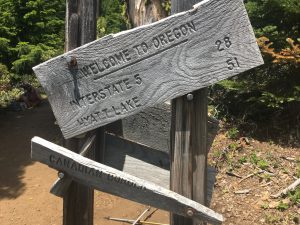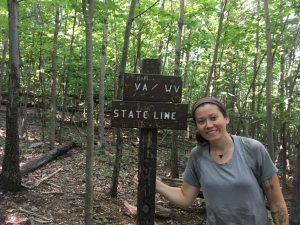There was more to Little John than I could initially see. At forty-seven, the combat veteran sat with me on a zero day (zero miles of hiking, also considered a rest day) in New England. He donned a scruffy beard almost down to his chest that appeared to keep most people from striking up conversation with him, which is just how he preferred it in the beginning.
Overall, he used his homemade barricade to his advantage when advantageous in social situations, yet somehow spoke clearly and succinctly through it. Admitting he came to the trail looking for answers, he didn’t come upon any until after the halfway point of the trail. But well before then, Little John was challenged within the first few weeks by his adversities that instantly brought him to his knees – literally.
“The first four weeks were the hardest, especially not having any thru-hiking experience whatsoever. The weather was tough for me. I can vividly remember sitting down on a stump or a rock on the trail and just crying because my feet hurt. My knees hurt. Everything hurts. I was wearing frozen wet clothes and if I stopped for too long I would freeze.” I instinctually folded my arms at the mere mention of how cold he was in early March.
“So the motivation in those low times was to pull myself up and get to that next place. My own agony, if you will, to try to alleviate the pain was my motivation. To get to that next town, that hot shower, sleep in a bed, have some food. That’s my motivation for the first month.” There’s no denying our appreciation for creature comforts like a simple meal or a comfortable bed that towns offer on a thru-hike, especially for first-timers.
Little John added, “You also don’t want to let everyone else down that you told you were going to hike the AT.” It amazes me how powerful social pressures can be, even when people still have internal motivations. Not wanting to let people down and preemptively thinking how they would view him were part of what kept him going through freezing cold conditions in the early weeks of his hike. This proves that we can start with somewhat strong motivations but be immensely taken aback by challenges like weather, making us question our fortitude. And even through such bleak spring conditions in the Appalachian Mountains, not wanting to let people down was enough to spur Little John forward. Boy are we complex creatures.
When northbound hikers begin in the spring they are often met with much colder weather than they anticipated, driving many to quit within the first few weeks. Little John drew from his military training and prior experiences to keep pushing forward, looking for relief through each storm. He was no stranger to finding creative ways to stay motivated. At home he aimed to find balance between long meetings to reach target goals and completing projects by their specified deadline, meanwhile working alongside project members with differing views and objectives.

The military taught him to compartmentalize and internalize his struggles while working towards the end goal at all costs. His deployments solidified his approach towards adversities when other lives were at stake besides just his. He remained present and ready for any challenge he came across on the AT, but that didn’t mean he always liked them.
When his fingers were so cold that he could no longer feel them and the trail was completely covered in snow, he focused on the upcoming campsite and silently repeated the necessary steps to boil water. When his body was aching from carrying a heavy pack up steep slippery mountains, he just sat on a tree stump in the rain and let his emotions take him over. When his feet felt like blocks of ice from the constant cold weather, he didn’t stop so as to eventually warm them up. And when he felt miserable and couldn’t see a good enough reason to withstand the elements in the woods, he just kept walking until he either found a reason or until the sun came out and shifted his feelings on the situation altogether.
“You have to think yourself through it,” he said about facing his adversities. “We had weather early on that was beating me down. You cry it out then you move on, saying ‘this isn’t helping me hike.’ You have to keep going, and that’s what I’ve done. The trail isn’t going to hike itself. Pissing and moaning about it is not going to do it either. You have to pick yourself up and go. It’s mind over matter, absolutely. And sometimes it’s difficult when you’re dealing with physical injuries and pains, but what are you going to do when you’re ten miles from the next shelter or town? You still have to walk there,” he said bluntly.
The adversities changed some of his immediate motivations in the day-to-day, but less so affected his overarching motivations. “At times the adversities made the trail suck worse than what it was. Mentally you make the trail what it’s going to be that day with the exception of certain terrain, people, and knee or foot issues. But the adversities are what you make of them. It doesn’t change much. I know the trail is going to be difficult on any given day. Today’s trail was easy, tomorrow, maybe not so much. You never know what you’re going to get. Just keep going.”
Quotes from both Forrest Gump and Finding Nemo swam around my head after hearing his last two sentences as I processed his no-nonsense mindset.



